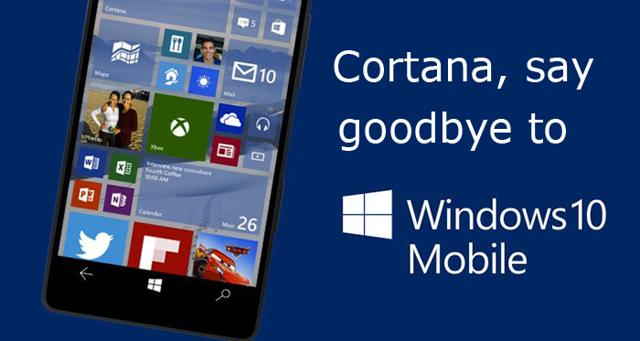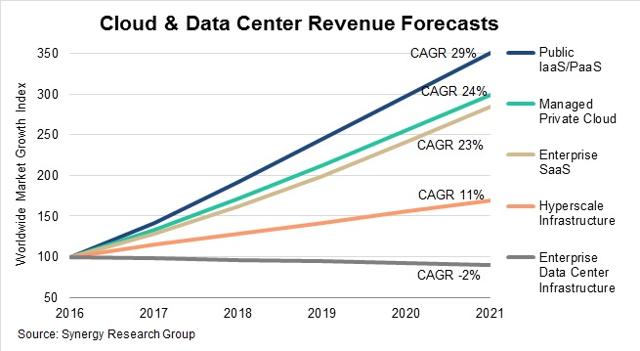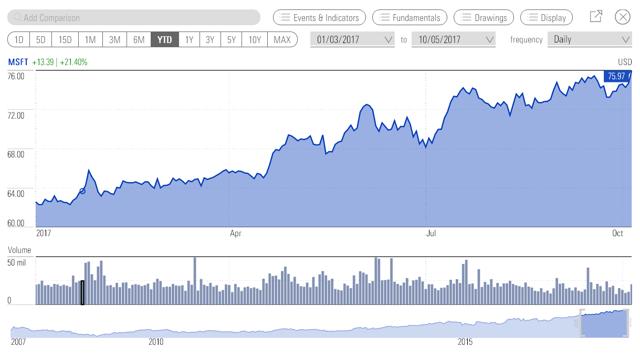HP's announcement that it is discontinuing its Elite x3 Windows 10 Mobile phone further confirmed that Microsoft completely shelved its smartphone ambition.
Nadella himself admitted in his book that he was against Microsoft's purchase of Nokia's old phone business. He wrote off the entire $7.6 billion acquisition.
Nadella never believed that Windows phones can catch up with Android and iOS. Don't expect a Surface phone to be released as long as Nadella is in charge.
My fearless forecast now is that Microsoft will soon discontinue support for Windows 10 Mobile. Microsoft ended support for Windows Phone 8.1 last July.
Shelving Windows 10 Mobile completes a cathartic release for Microsoft from its misadventure in mobile phones.
Microsoft (NASDAQ:MSFT) is being quiet, but it is ready to say sayonara to Windows 10 Mobile. It already ended support for Window Phone 8.1 last July. Getting rid of Windows 10 Mobile should complete the detoxification of Microsoft's failure in mobile. HP, Inc. (NYSE:HPQ) recently announced that it will discontinue its Elite x3 Windows 10 Mobile smartphone.
An unidentified HP executive explained that "Microsoft, as all companies do, decided on a change in strategy and so they are less focused on what they thought they would be focused on today."

(Source: Microsoft)
We did not get the memo but Microsoft made it clear to its OEM partners that Windows 10 Mobile is a walking dead. Microsoft already ended support for Windows Phone 8.1 last July. The culling will continue until Windows 10 Mobile eventually joins the graveyard where Zune and Windows RT were laid to rest.
Nadella's book also revealed he was against Ballmer's idea of buying Nokia's (NYSE:NOK) old phone business. It explained why Nadella ended up writing off the $7.6 billion Lumia phone business that Ballmer acquired. His heart and mind were never for Windows smartphones. He is determined to extricate Microsoft out of its misery in Windows phones.
We can expect that there will never be another phone from Microsoft as long as Nadella is in charge. Consequently, there will be no eulogies, but Windows 10 Mobile's days are numbered. Sooner than later, Microsoft will completely divorce itself from Windows 10 Mobile like it did with its phone hardware business.
There's no point developing/maintaining a mobile operating system when Microsoft has thrown the towel on Windows phones.
The only consolation is that Microsoft got a $1.8 billion tax write-down from Ballmer's ill-fated bet on Windows phones. Windows 10 Mobile also taught us that software developers did not like Microsoft's Universal Windows Platform.
Why Letting Windows 10 Mobile Die Is Cathartic For MicrosoftRaising the white flag and accepting defeat is an act of courage. Accepting the reality that Android and iOS reign supreme on mobile is a back to the future move from Nadella. It allows Microsoft to better adapt to the reality that Android OS devices now outnumber Windows computers/devices.
Without the excess baggage of Lumia and Windows 10 Mobile, Nadella can focus more on his device-agnostic strategy in disseminating Microsoft's software products and services. The prosperity of Microsoft now depends on how effective it can attract (and retain) business and personal users of Android/iOS/MacOS devices to buy/subscribe to Office 365, Skype, OneDrive, and Azure.
Microsoft tried and failed to compete against iPhones. However, its Cellular PC concept which enables Surface hybrid laptops to make phone calls should help it continue disrupting Mac sales.
Cloud Computing, Not Smartphone ComputingA complete retreat from Windows phones and Windows 10 Mobile will let Microsoft focus more on competing better against Amazon (AMZN) Web Services. Microsoft is the clear leader in SaaS (Software-as-a-Service). However, Azure is still a far-second to Amazon when it comes to cloud computing infrastructure services.
The savings from killing the Lumia phone business and Windows 10 Mobile can go to improving Azure.

(Source: Synergy Research)
Abandoning Windows phones gives Microsoft more leeway to create new cloud computing services like its Coco Framework Enterprise Blockchain-as-a-Service. A stronger focus on cloud computing is very important for Microsoft. Synergy Research predicted last July that global revenue from cloud computing and SaaS will have a CAGR of 23-29% for the next five years. It will reach $200 billion by 2020.
Public IaaS/PaaS, where Amazon Web Services is the runaway leader (with 34% market share), is going to have the fastest CAGR at 29%.

MSFT already touts an YTD gain of +21.40%, but I still rate it as a buy. My takeaway is that Nadella is weaning Microsoft away from its dependency on the Windows ecosystem. A Microsoft that can flourish without its dominant Windows operating system becomes a more resilient company.

(Source: Morningstar)
Microsoft doesn't need its own mobile operating system, mobile app store, and its own brand of phones to benefit from the rise in smartphone usage.
Microsoft's software products and services are now device agnostic and platform independent. Many Android/iOS device users will still be captured customers of Office 365. Let us also never forget that Microsoft will continue to reap patent licensing fees from Android device manufacturers.
The coming demise of Windows 10 Mobile is therefore just another painful lesson that made Microsoft smarter and stronger.
Disclosure: I am/we are long MSFT, AMZN, HPQ, NOK.
I wrote this article myself, and it expresses my own opinions. I am not receiving compensation for it (other than from Seeking Alpha). I have no business relationship with any company whose stock is mentioned in this article.
Source: Why Microsoft Bid Sayonara To Windows Phones And Windows 10 Mobile
No comments:
Post a Comment